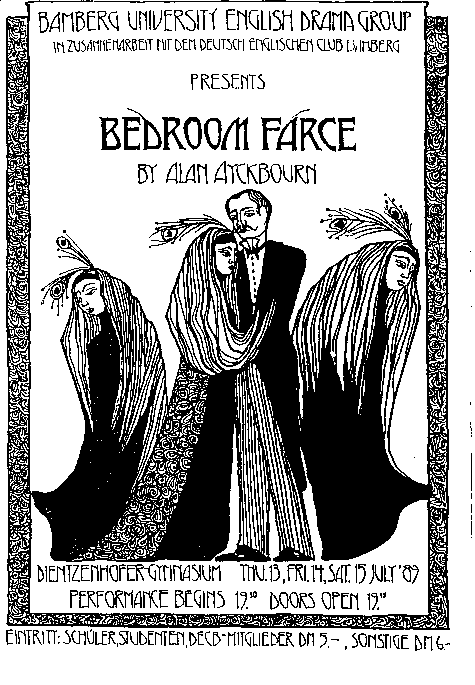
The Players
| Ernest ...................................................... | Stefan Hümmer |
| Delia ........................................................ | Cora Kusebauch |
| Nick ......................................................... | Christoph Futschek |
| Jan ........................................................... | Tini Weidner |
| Malcolm .................................................. | Volkhart Baumgärtner |
| Kate ......................................................... | Claudia Dechant |
| Trevor ...................................................... | Copeland Woodruff |
| Susannah ................................................. | Sibylle Friz |
An evening, and the following night.
The Team
-
Lighting .................................................... Jürgen Hoh Make-up .................................................. Isabella Weber Front of House ......................................... Jody Skinner, Chris Wilder Video Work ............................................. Manfred Haaß Poster Design .......................................... Tini Weidner Costumes & props ................................... The Players -
- Directed by Mike Claridge
-
The Work
| lt is somewhat surprising that Alan Ayckbourn‘s plays are not presented more often on the German stage. His output is certainly considerable and his popularity in Great Britain is generally believed to be rivalled only by that of William Shakespeare. Indeed, his works are often adopted for amateur theatrical companies (something which he himself put to good use in A Chorus of Disapproval).
lt is in this that we can perhaps see an indication for the reason behind the rarity with which an Ayckbourn work makes an appearance abroad. The writer's creations, whether the characters themselves or the surrounding dramatic framework, are so very British in nature. Where other theatrical traditions would result in either totally unserious slap-stick comic farce or completely unfunny psychological "insight", Ayckbourn takes a series of British stereotypes - the unsuccessful but eager „do-it-yourself“er, the hen-pecked husband, the married couple for whom sex is a naughty word and/or mere male ego-massage, the young wife who believes that marriage starts and ends in bed, indeed the whole „British“ attitude to sex and marriage - and, while lightly tickling our ribs, slyly makes his point. We may laugh at what happens, but at times the laughter is uneasy. We may come from a different background, from the viewpoint of class or nationality; nonetheless, we sense a sometimes uncomfortable affinity with the characters and their problems. We are confronted in Bedroom Farce with four married couples, whose relationships are at various stages of development. Ernest and Delia have been married for over thirty years. They are content in the stability of their rather dull life together, each having accepted the state of affairs - and particularly the dominant role of Delia - long ago. As they prepare to go out for their wedding anniversary dinner, their only causes for concern are a hole in the roof and the marriage of their son, Trevor. They would have preferred him to marry his former girlfriend, Jan, instead of Susannah. lt appears at first that there are also problems in Jan's marriage with Nick. He claims to have badly injured his back, and is lying in bed bemoaning his fate. He is the kind of person for whom life can never be right. Moan, moan, moan. However, as the play progresses we realise that Nick is simply envious of anyone whose fortune is better than his own; in this case, his complaint is caused by the fact that Jan is going to a party, leaving him behind. His constant comments regarding her fidelity to him in fact conceal a secure relationship, if one that his egotism occasionally puts under considerable strain. The party to which Jan is going is a house-warming party, given by Kate and Malcolm. The immediate impression is that they have a very stable marriage. Developments at the party - in particular, comments by and about Trevor and Susannah - reveal that the relationship is far from ideal. Kate is, on the whole, a willing servant- and mother-figure to the unconsciously self-centred Malcolm; only rarely do his infantile jokes and lack of consideration for others provoke her to protest. Thus, she is hardly the most suitable person to advise Trevor and Susannah about their marriage. One senses that her relationship with Malcolm will continue along its present course: superficial contentment, coupled with a faint sense of unease. Ayckbourn appears to be focussing his play upon the question of what will happen to Trevor and Susannah, whether their marriage is doomed or can be saved. In fact, this provides little more than a vehicle for a general examination of relationships between husband and wife; the final resolution of the plot is less important than the implication to the spectator that he/she should actively examine his/her own relationship. Most important of all, the play stresses how important it is that both partners be prepared to admit to mistakes made and to do all they can to make their relationship work. Are you doing all that you can for your relationship? (Michael Claridge)
|
We would also like to thank:
|







